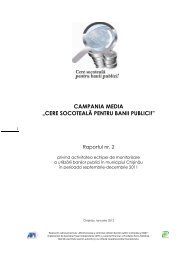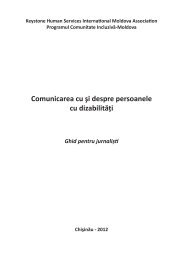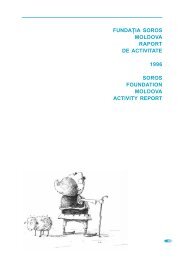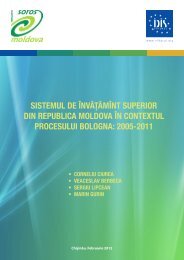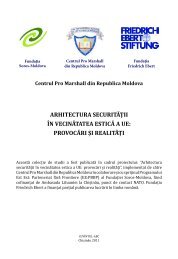Perceptions of the Population of the Republic of Moldova - Soros ...
Perceptions of the Population of the Republic of Moldova - Soros ...
Perceptions of the Population of the Republic of Moldova - Soros ...
- No tags were found...
You also want an ePaper? Increase the reach of your titles
YUMPU automatically turns print PDFs into web optimized ePapers that Google loves.
<strong>Perceptions</strong> <strong>of</strong> <strong>the</strong> <strong>Population</strong> <strong>of</strong> <strong>the</strong> <strong>Republic</strong> <strong>of</strong> <strong>Moldova</strong> on Discrimination: Sociological Study 5932% <strong>of</strong> <strong>the</strong> respondents who witnessed a case <strong>of</strong> discrimination reported that <strong>the</strong> last incidentoccurred in <strong>the</strong> street, 20% – at job, 11% – at school, 11% – at policlinics, 8% – at <strong>the</strong> store, 5% – in publicareas, 5% – at <strong>the</strong> police, 4% – at <strong>the</strong> mayor’s <strong>of</strong>fice.38% <strong>of</strong> <strong>the</strong> respondents who witnessed a case <strong>of</strong> discrimination mentioned that, during <strong>the</strong> lastincident, <strong>the</strong> persons had been discriminated because <strong>the</strong>y were poor, 24% – because <strong>of</strong> <strong>the</strong>ir age, 16% –because <strong>of</strong> <strong>the</strong>ir ethnicity, 15% - because <strong>the</strong>y were women, 11% – because <strong>of</strong> <strong>the</strong>ir health status, 6% –because <strong>of</strong> <strong>the</strong>ir religion, 3% – because <strong>of</strong> <strong>the</strong>ir sexual orientation.One in three witnesses <strong>of</strong> discrimination cases tried to not get involved in any way in <strong>the</strong> incident.Thus, 15% said <strong>the</strong>y had no reaction at all, 11% - turned away and left <strong>the</strong> place and 5% tried to prove that<strong>the</strong>y had not seen anything. About 24% showed sympathy to <strong>the</strong> discriminated persons, one in tworespondents comforted <strong>the</strong>m, and 7% encouraged <strong>the</strong>m to go to court, and only 26% showed disapproval<strong>of</strong> <strong>the</strong> discriminator.Chart 45. Respondents’ reaction to <strong>the</strong> last case <strong>of</strong> discrimination, % <strong>of</strong> witnessestried to prove <strong>the</strong>y had not seenanythingencouraged <strong>the</strong> discriminatedperson to go to courtcomforted <strong>the</strong> person who wasdiscriminated5710turned away and left11had no reaction at allshowed compassion for <strong>the</strong>discriminated personshowed disapproval <strong>of</strong> <strong>the</strong>discriminator152426The share <strong>of</strong> people who showed disapproval is higher in <strong>the</strong> urban area (32%), among women (29%),in <strong>the</strong> age group 18-34 (30%), among school and university students (31%), among persons <strong>of</strong> Gagauzethnicity (53%) and Bulgarian ethnicity (32%). The rate <strong>of</strong> people who showed compassion is higher amongpersons aged 50-64 (30%), and among those with junior high school education (31%) or vocationaleducation (35%). The rate <strong>of</strong> respondents who had no reaction at all is higher among people aged 35-49(20%), with junior high school education (22%), and with a low level <strong>of</strong> well-being (24%). The share <strong>of</strong>respondents who turned away and left <strong>the</strong> place is higher among people aged over 65 (29%), andUkrainians (24%).Respondents’ attitudes regarding <strong>the</strong> punishment <strong>of</strong> discriminators75% <strong>of</strong> <strong>the</strong> surveyed persons consider that discriminators have to be punished. The number <strong>of</strong> thosewho share this opinion is higher in <strong>the</strong> urban area (78%), in <strong>the</strong> age group 18-34 (79%).According to <strong>the</strong> respondents, <strong>the</strong> most appropriate punishments for those who commitdiscrimination would be <strong>the</strong> following: fine (28%), warning (18%), criminal sanctions (16%), damages (13%),community service (12%), and imprisonment (4%).




